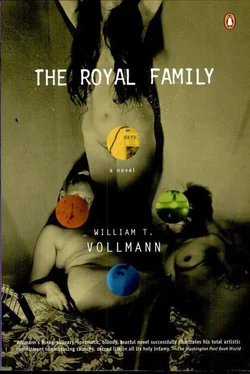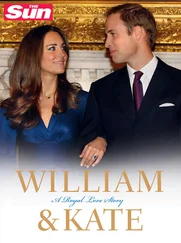He honked four times, and she came running. He said: Do you remember me?
Sure, asshole. You’re the misogynist. Are you dating or not?
I’m lonely, he said. I’ll pay you five bucks just to ride around the block with me.
Ten’ll work.
How about seven?
Fucking cheapskate, she laughed, getting in. He counted out a five and two ones from his wallet, added another single for courtesy, and drove silently around the block.
Here we are, he said.
You mean that’s it?
Uh huh.
You know what? said Domino. You’re a fool. You’re making me really angry.
Because you got something for nothing, but it wasn’t enough? Or did I hurt your feelings because I didn’t want to fuck you?
Look, pal. You don’t know the first thing about my feelings. So don’t patronize me.
I’m not trying to patronize you, he said. I was just lonely, that’s all. And I thank you for riding with me.
She softened. — All right, she said. What’s your name?
Henry.
I’m Domino.
I know.
She kissed his cheek faster than any rattlesnake could ever strike, then leaped out of the car and loped away. Tyler smiled uneasily, scratching his chin.
Uncovering no activity at the entrance to the parking garage (a fact of little probable value, which he recorded nonetheless on the surveillance report form soon to pad out Brady’s files), Tyler drove up to Union Street where an immense pear of light bloomed from an apartment’s stairway and stretched halfway across the pavement. A truck blinked its weary lights, and a foghorn warned of the least dangerous thing.
His brother John came out, holding another woman’s hand.
Once Irene had asked him whether he had any reason to believe that his brother might be unfaithful, and he, professionally knowing that all men and all women were unfaithful to something, said: I don’t know. I wondered that at your wedding. I hoped that he’d be good to you. I wanted you to be happy…
And tonight, of course, he’d been holding Irene’s hand.
John Alan Tyler was not yet sufficiently established in his career to own a house in San Francisco, much as that would have pleased his wife. This had less to do with money than with the allocation of money. (Doesn’t that apply to all of us? Couldn’t the crazy whore buy a mansion in Pacific Heights, if only a certain percentage of her gross receipts went into the piggybank for, say, seven thousand years?) Although John was still young, having only recently passed the third-of-a-century mark, he received a salary almost commensurate with his idea of his own importance. Much of it he had to spend on clothes, because in the office it was a matter of faith for all to appear in five different suits a week, with extra apparel for interviews, public appearances and business trips. John did not set this policy, and I cannot disparage him for abiding by it. Then there were his neckties, which his brother had mocked during that first meeting with Domino. You wouldn’t believe how expensive a necktie could be until you’d gone shopping with John, who remained convinced, perhaps rightly, that everybody who mattered knew how much those neckties cost, and treated the wearer accordingly. — His elder brother, to whom stripes were stripes and plaids were plaids (or, when he was drunk vice versa), did not matter. Still, John would say one thing for Hank: He was very good to Irene.
John was well aware that his wife had reason to feel neglected. He loved her sincerely. When she had broken off their engagement, he hadn’t even reproached her, although sitting alone he’d slowly squeezed a wineglass in his hand until it shattered. John belonged to the Order of Backbone. When called upon, he could be generous and magnanimous, even good. Once Irene agreed to marry him after all, their future deliciously in the bag, he did not feel quite so called upon. Irene was an excellent woman who’d undoubtedly go to heaven when she died. But a necessary part of her excellence was an idealism which he admired but did not share. To speak more plainly, John had discovered that Irene was positively mushy with fantasies. She’d required a “fairytale wedding,” which he’d provided, although his mother had been against it and he was still paying off the bills. She also expected to live happily ever after. She seemed to believe that since they were married, he shouldn’t work anymore, just stay home day and night with her. She was spoiled. John had to put her straight. First of all, he explained, he did have his friends, who had known him long before he’d met her and whom he was not prepared to dismiss simply because he had married somebody. Then there was the fact that he did have to go to work amidst the tan-hued, grooved cliffs of the financial district, where below mailboxes and flags, chilled by the Transamerica Pyramid’s steeply tapering shadow, breadwinners hastened to new appointments, with their neckties blowing. Irene for her part had started as a dental receptionist, but then the dentist got audited and that was the end of that. She was reading the want ads now — so she said. John wished that she didn’t get so sad and bored, especially on those foggy rainy nights when he must stay late at the office. Precisely because he did not intend to work for Rapp and Singer more than another five years (unless they made him full partner on excellent conditions), he had to put in his time. He wanted a brilliant promotion, and then he wanted to transship, probably for Harville and Keane, although Dow, Emerson, Prescott and Liu occupied a comparable place in his aspirations. Once he had gotten in solid with Harville and Keane, which would take another three years of late office nights, he wouldn’t be much over forty and Irene would be just thirty-four, at which point they could start a family. John knew not to stop at one child, which would otherwise grow up lonely and spoiled like his wife. He himself had benefitted from the fraternal relation, as he was the first to acknowledge; certainly Hank felt the same way. Sometimes he wished that he and Hank had been closer in age. As John saw it, the second child ought to come quickly after the first — ideally, not more than a year later. Two nearly at once would be less work for Irene than two spaced several years apart. Besides, they could play together. Whether or not there would be a third child remained open to discussion. If Irene felt strongly one way or the other, he would not quarrel with her. When he closed his eyes, however, he could imagine two little boys and a little girl; he could almost see their half-Asian faces and dark eyes as they played games on the living room carpet, their voices lowered because he was working. The boys would be named Eric and Michael, and he thought that their sister would be called Suzanne. Irene could choose their Korean middle names, which she’d most likely do in consultation with her extended family. She had already agreed to stay home for a few years once the babies were born. In fact, a few months after their marriage John had spoken with his mother-in-law about this. Where was Irene then? She must have been out shopping with her cousins, or playing golf with her father. The conversation would have taken place at Christmas, when they always drove down to Los Angeles. Although Irene loved to complain about his rudeness to her parents, he and they actually got along quite well. Irene’s mother said that Eric, Michael, and Suzanne all sounded like excellent names. In confidence, she told John that Irene lacked common sense. She hated to say this about her own daughter, she continued, smiling and ducking her head, but that was how it was. Irene always went about with her head in the clouds. Her mother thought her quite lucky to have met a man like John, who would take care of her and perhaps indulge her a little. John nodded while his mother-in-law refilled his soju glass. He knew that nothing he could do would make Irene’s parents happier than transforming them into grandparents. And Irene wanted children even more than he. In about seven years, then, life would be exactly as it should be. They would have a house in Marin, which would soothe his southern California girl of a wife, who remained unaccustomed to this crowded, expensive city where most people had to live in apartments.
Читать дальше












